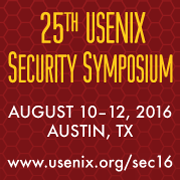How the ELF Ruined Christmas
Alessandro Di Federico, University of California, Santa Barbara and Politecnico di Milano; Amat Cama, Yan Shoshitaishvili, Christopher Kruegel, and Giovanni Vigna, University of California, Santa Barbara
Throughout the last few decades, computer software has experienced an arms race between exploitation techniques leveraging memory corruption and detection/protection mechanisms. Effective mitigation techniques, such as Address Space Layout Randomization, have significantly increased the difficulty of successfully exploiting a vulnerability. A modern exploit is often two-stage: a first information disclosure step to identify the memory layout, and a second step with the actual exploit. However, because of the wide range of conditions under which memory corruption occurs, retrieving memory layout information from the program is not always possible.
In this paper, we present a technique that uses the dynamic loader’s ability to identify the locations of critical functions directly and call them, without requiring an information leak. We identified several fundamental weak points in the design of ELF standard and dynamic loader implementations that can be exploited to resolve and execute arbitrary library functions. Through these, we are able to bypass specific security mitigation techniques, including partial and full RELRO, which are specifically designed to protect ELF data-structures from being coopted by attackers. We implemented a prototype tool, Leakless, and evaluated it against different dynamic loader implementations, previous attack techniques, and reallife case studies to determine the impact of our findings. Among other implications, Leakless provides attackers with reliable and non-invasive attacks, less likely to trigger intrusion detection systems.
Open Access Media
USENIX is committed to Open Access to the research presented at our events. Papers and proceedings are freely available to everyone once the event begins. Any video, audio, and/or slides that are posted after the event are also free and open to everyone. Support USENIX and our commitment to Open Access.
author = {Alessandro Di Federico and Amat Cama and Yan Shoshitaishvili and Christopher Kruegel and Giovanni Vigna},
title = {How the {ELF} Ruined Christmas},
booktitle = {24th USENIX Security Symposium (USENIX Security 15)},
year = {2015},
isbn = {978-1-939133-11-3},
address = {Washington, D.C.},
pages = {643--658},
url = {https://www.usenix.org/conference/usenixsecurity15/technical-sessions/presentation/di-frederico},
publisher = {USENIX Association},
month = aug
}



















connect with us